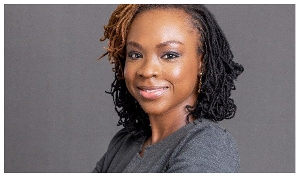 Karen Judy Kwarteng, Head of Global Market Sales at Stanbic Bank Ghana
Karen Judy Kwarteng, Head of Global Market Sales at Stanbic Bank Ghana
The Bank of Ghana’s Monetary Policy Committee has opted to maintain the benchmark interest rate at 29 percent, a strategic move aimed at tackling inflation uncertainties spurred by currency pressures, utility tariff adjustments, and rising fuel prices.
The move has been described by economic analysts as a cautious stance in managing the country’s economy in a challenging time.
In an interview with CNBC Africa, Karen Judy Kwarteng, Head of Global Market Sales at Stanbic Bank Ghana, discussed the implications of the central bank holding the benchmark rate at 29%.
She noted that despite an earlier 100-basis point rate cut, the hold on the current rate is deemed necessary to help moderate inflation and support disinflation efforts in the latter half of the year. The Bank of Ghana has set an inflation target of 13 to 17 percent by the year’s end, aligning with the government’s goal of 15 percent.
Karen Kwarteng also highlighted the promotion of robust fiscal consolidation as a complement to monetary policy.
She mentioned that “For fiscal consolidation, it is critical for government to increase revenue generation and reduce expenditure to mitigate inflationary pressures. Key government initiatives such as the Ghana.gov platform and the Ghana Integrated Financial Management Information System are pivotal in these efforts.”
The Standard Bank Executive further expressed optimism about the appreciation of the local currency in the near term, attributing this to the restructuring of the €13.1 billion euro bonds and anticipated IMF disbursements in November.
She noted that “These factors are expected to provide much-needed support to the currency despite ongoing challenges such as declining cocoa earnings, which have hampered the regulator’s capacity to intervene in the forex market.”
In recent times, high lending rates, driven by elevated reference rates, have continued to pose challenges for businesses in Ghana seeking affordable credit. Nevertheless, Karen Kwarteng commended the resilience of Ghana’s banking sector, which has shown stability following the domestic debt restructuring program.
She also acknowledged that “Support from regulatory and governmental bodies has been instrumental in this recovery, enabling banks to navigate the post-restructuring landscape effectively.”
As Ghana navigates the challenges of inflation management and strives for economic stability, the collaboration between monetary and fiscal authorities will be crucial.
The focus on fiscal consolidation, prudent financial management, and strategic monetary policy is aimed at addressing current economic challenges and paving the way for a more resilient and sustainable future for the country.
The Bank of Ghana’s decision to hold the benchmark rate at 29%, therefore, reflects a strategic approach to managing inflation and economic stability.
With continued efforts in fiscal consolidation and supportive monetary policies, it is likely that the country will overcome current economic challenges and achieve sustainable growth.
The resilience of the banking sector and optimism about currency appreciation further contribute to a cautiously positive outlook for the country going forward.